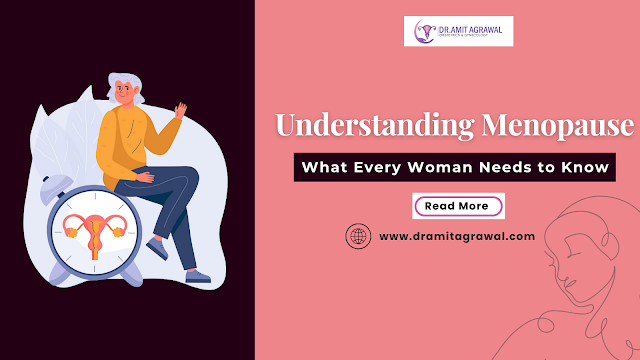Menopause is a natural and inevitable stage in a woman’s life, yet it often comes with a range of emotional and physical challenges. For many women, menopause can feel like a daunting experience filled with uncertainty. Dr. Amit Agrawal recognizes the complexity of this transition and believes that understanding menopause is key to managing its symptoms. By arming yourself with knowledge and the right support, you can take control of your health during this important phase and confidently navigate the changes that come with it.
What is Menopause?
Menopause is medically defined as the point in time when a woman hasn’t had a menstrual period for 12 consecutive months. The average age of menopause is around 51, though it can happen earlier or later, typically between the ages of 45 and 55. This marks the end of the reproductive years as the ovaries stop producing eggs, and the levels of the hormones estrogen and progesterone decline significantly.
While menopause is a natural part of aging, the hormonal changes that accompany it can cause a variety of symptoms. It’s important to understand that menopause affects every woman differently. Some women experience mild discomfort, while others may face more disruptive symptoms.
The Hormonal Shift and Its Impact
The hormonal fluctuations that take place during menopause are the main drivers behind the various symptoms women experience. As estrogen and progesterone levels decrease, several bodily functions and systems are affected. This hormonal shift can result in a variety of symptoms, some of which are more well-known, while others may come as a surprise.
In addition to the physical effects, the emotional and mental changes during menopause can also be significant. Many women report feeling more stressed, anxious, or depressed during this time due to hormonal imbalances, but understanding what’s happening in your body can make it easier to cope.
Common Symptoms of Menopause
- Hot Flashes & Night Sweats: One of the most common and uncomfortable symptoms of menopause is the hot flash. Hot flashes are sudden, intense feelings of heat that spread throughout the body, often followed by sweating. These can occur during the day or at night, leading to night sweats that disrupt sleep and leave many women feeling fatigued.
- Mood Swings: Hormonal changes can cause emotional fluctuations, from irritability to anxiety or sadness. Many women find that they experience mood swings or heightened sensitivity during menopause, which can affect their relationships and overall well-being.
- Sleep Disturbances: Difficulty sleeping, often due to night sweats or discomfort from other menopause symptoms, is a common issue. Poor sleep quality can further exacerbate feelings of fatigue, irritability, and anxiety.
- Vaginal Dryness: As estrogen levels drop, vaginal tissues may become thinner and drier. This can lead to discomfort during sexual intercourse, as well as an increased risk of urinary tract infections and other vaginal issues.
- Changes in Libido: A decrease in estrogen and other hormones may lead to a reduced interest in sex. While this is common, it’s important to note that it’s also a symptom that can be managed.
Managing Menopause Symptoms with Confidence
While menopause is a natural process, the symptoms it brings can often feel overwhelming. However, with the right approach, these symptoms can be managed. Dr. Amit Agrawal, a trusted expert in women’s health, works closely with his patients to develop personalized strategies for navigating this transition.
- Adopt a Healthy Lifestyle: Regular exercise is crucial for maintaining physical and mental well-being during menopause. Activities like walking, swimming, and yoga can help reduce hot flashes, improve mood, and enhance sleep quality. Additionally, maintaining a balanced diet rich in nutrients like calcium, vitamin D, and magnesium can support overall health.
- Consider Hormone Replacement Therapy (HRT): For women experiencing severe symptoms, hormone replacement therapy (HRT) may be an option. HRT involves taking estrogen or a combination of estrogen and progesterone to replenish the hormones that the body is no longer producing. However, it’s important to consult with Dr. Agrawal to understand the risks and benefits of this treatment.
- Relaxation and Stress Management: Practicing relaxation techniques, such as mindfulness, meditation, or deep breathing, can help reduce anxiety and improve sleep. Yoga is also a great way to enhance flexibility and reduce stress while promoting overall wellness.
- Stay Connected with Healthcare Providers: Menopause is not just about managing symptoms; it’s also an opportunity to focus on long-term health. Women going through menopause are at an increased risk for osteoporosis, heart disease, and other conditions. Regular check-ups with Dr. Agrawal ensure that any potential health issues are caught early and treated appropriately.
When to Seek Help
If you’re experiencing persistent symptoms of menopause or find that they are significantly affecting your quality of life, it’s time to seek professional help. Dr. Amit Agrawal is committed to providing expert care and guidance to women experiencing menopause. He can help you find the most effective solutions tailored to your unique needs, ensuring that you feel supported every step of the way.
Contact Dr. Amit Agrawal
If you’re ready to take charge of your health and learn how to manage menopause with confidence, Dr. Amit Agrawal is here to help. Book a consultation today and receive personalized care that will make this transition smoother and more manageable.
📍 Visit: Swastik Clinic, B2-17, Opposite Duttaguru Society, Sector 15, Vashi, Navi Mumbai
📞 Call Us: +91 8850461614 | +91 9437163294
📧 Email: dramit19@yahoo.com
For more information, visit Dr. Amit Agrawal’s Website.




